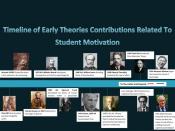Motivational Theories
Seven people were chosen who were thought to be representatives of a diverse work force. The data was compiled provided by the Work Motivation Survey found on the University of Phoenix resource page to determine what the individual strengths and weaknesses were of the team. Next, four motivational theories were chosen that were believed to be the best motivators to help the team through the changes caused by the merger/acquisition. The purpose of this paper is to assess the impact of the data that was gathered on employee job satisfaction and motivation.
Personality Profiles
Data, from the following individual surveys, is compiled in Table 1.
Individual #1
Team member #1 is male and has worked with the company over 10 years as a professional. He is highly motivated by completing difficult challenges. He has a strong need to be liked by others and enjoys building close relationships with his co-workers.
However, he would much rather work by himself. He is not motivated by setting and achieving goals and is only moderately competitive. He does not prefer an authoritative role and enjoys feedback on his work progress.
Individual #2
Team member #2 is a male who has worked with the company less than two years in production/assembly. He is not motivated to improve his work performance and prefers little or no competition. He has problems focusing on the task at hand because of socializing with fellow co-workers. He desires no position of authority and does not want difficult challenges. He is highly confrontational but likes to work in a team setting. He doesn't like to be influential or belong to group organizations. He likes to know the progress of his work.
Individual #3
Team member #3 is a female who has worked for the company for 3-5 years in...



Motivational Theories
Excellent.
Very thorough and in-depth. Strong research material and makes for a good discussion.
On a technical note...excellent unity,coherence, and emphasis.
4 out of 4 people found this comment useful.